BMW 520d Touring: why diesel is still relevant in the electric age
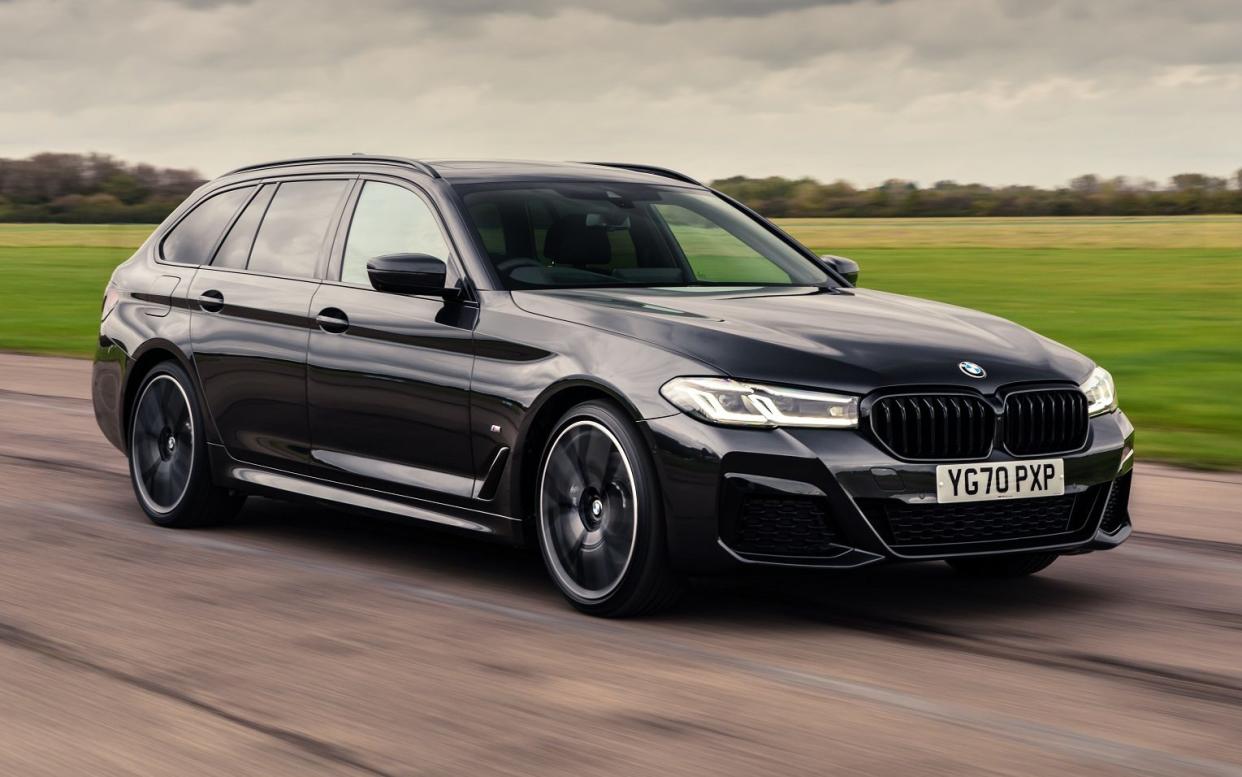
Once upon a time, a diesel estate car was seen as the ultimate family hauler. Of course, those were the days before SUVs and electric cars became the zeitgeist – and before diesel’s name was sullied as a result of certain nefarious activities by folk over at a certain Wolfsburg-based automotive conglomerate.
Today, the fuel’s popularity is waning, as indeed is the estate car. Waning, but not entirely diminished, that is, because there are still plenty of diesel estates on sale.
Diesel estates like this BMW 520d Touring. The 5-Series is one of the best large executive cars out there, not to mention one of our favourite estate cars, and it’s just had a facelift, which should – in theory – make it even better.
But should you give it the time of day – or is a plug-in SUV now a better bet? Read on to find out – and Don’t forget to register or login to find out our decisive verdict.
Pros
Lovely, fluid handling
Brilliant interior
Impressive fuel efficiency
Cons
Jittery ride on large-diameter wheels
Relatively high price
Virtual dials aren’t the easiest to read
Along with a spot of nip-and-tuck, this mid-life primp has brought hybridisation to the 5-Series range, though as with many of its rivals this is hybridisation in its mildest form. That means most engines – including this entry-level diesel – now get a starter motor that also acts as a generator, which charges a little additional battery that can store a small electric boost.
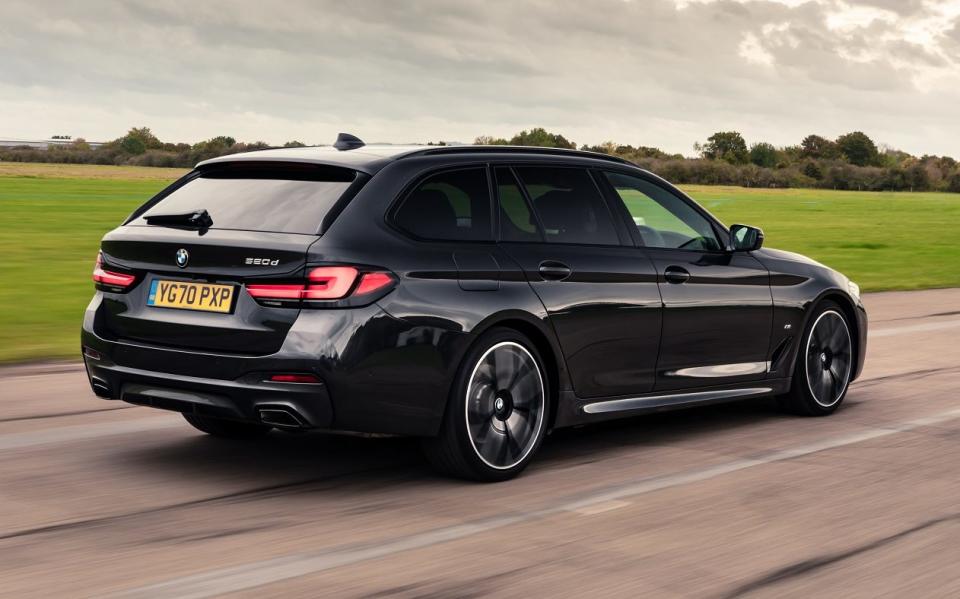
This set-up can’t power the car on its own, but it does mean the combustion engine can stop earlier and restart later at junctions or in traffic, and provides a boost that helps with acceleration, thus saving small amounts of fuel and reducing emissions.
In this 520d, the electric bits are hooked up to a 2.0-litre four-cylinder diesel engine, and the result is 187bhp in total. If it’s not to your taste, however, you can choose instead between two petrol engines, two plug-in hybrids, and one further diesel.
Four-wheel drive is available on all but the cheapest petrol, meanwhile, and standard on the most powerful models, and all of the engine options come with an automatic gearbox – there’s no manual alternative.

Take your pick of SE or M Sport versions; the former gets leather, dual-zone climate control and sat-nav as standard, while the latter, which we’ve got here, adds sportier styling and bigger wheels for a higher price.
Carrying capacity
We’ll start at the back, because if we’re honest, an estate is all about its rump. The 5-Series’ is pretty spacious, broadly on a par with all of its rivals – the Audi A6, Volvo V90 and Jaguar XF Sportbrake – with the exception of the Mercedes-Benz E-Class, whose ability to squeeze in a whole additional suitcase’s worth makes it the undisputed king of capacity.
You can fold the rear seat backs individually, which makes life easier if you need to carry something long and slender as well as two rear seat occupants. That said, because the seats don’t slide, you don’t quite get the same versatility you would in some SUVs.

The seats themselves are plenty spacious enough for three adult occupants – though the one in the middle will feel like they have the poorer end of the bargain thanks to their narrower seat and the hump in the floor, something you can again avoid with certain SUVs.
By comparison with its closest estate-shaped rivals, however, it’s much of a muchness, which is a good thing given all of them are pretty roomy too. The same goes for the front seats, whose occupants are treated to a wide range of seat adjustment and a plethora of storage spaces for odds and ends.
We’re big fans of the 5-Series’ dashboard; unlike the A6 and V90, which have resorted to touchscreens for almost all the major controls, BMW has retained physical switches for the climate controls, which is a blessed relief when all you want to do is to prod a button to adjust the temperature.
Classy design and materials
Elsewhere you’ll find the sort of high-end materials and classy design we’ve come to expect from a BMW interior, and the swift responses of the big, crisp entertainment screen make it a joy to use.
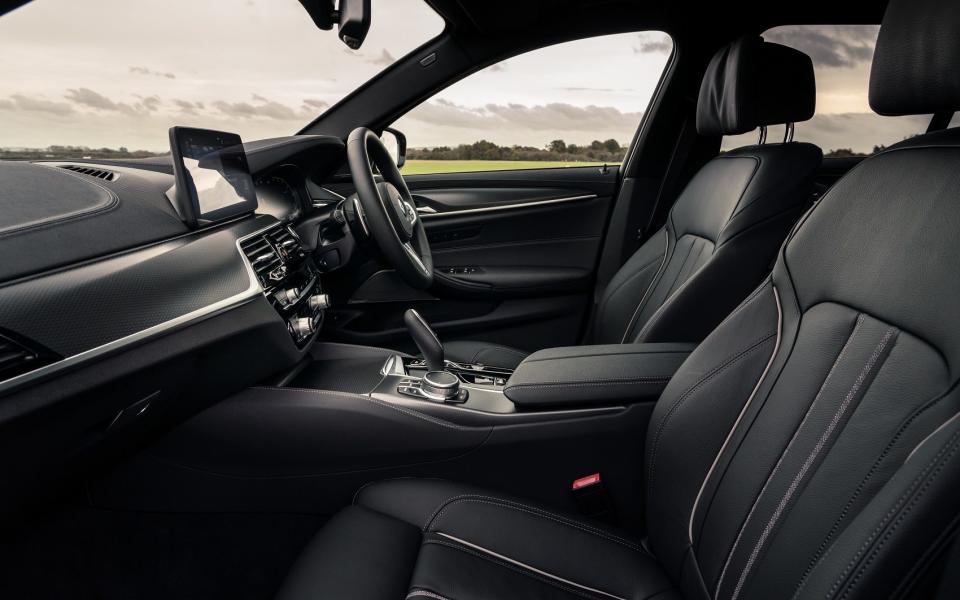
Handily, you can also choose between using touch or the central rotary knob to control the screen, which makes it easier to adjust on the move. There are a lot of functions within its menus, mind you, but because they’re all well laid out, it’s relatively easy to find your way around.
Less of a success is the screen that’s replaced the gauge pod ahead of the driver. As with all recent BMWs, the stylized representations of the speedometer and rev counter are harder to read than conventional dials; the way the various displays overlap makes it look crowded, too, and harder to find the information you’re after.
The price is right – just
The 5-Series’s price is a touch on the steep side; most of its rivals undercut it on a like-for-like basis, with only the A6 Avant costing more. And despite its depreciation being similar in percentage terms to most of its rivals’, because it starts from a higher price point, you’ll lose slightly more on it in terms of cold, hard cash.
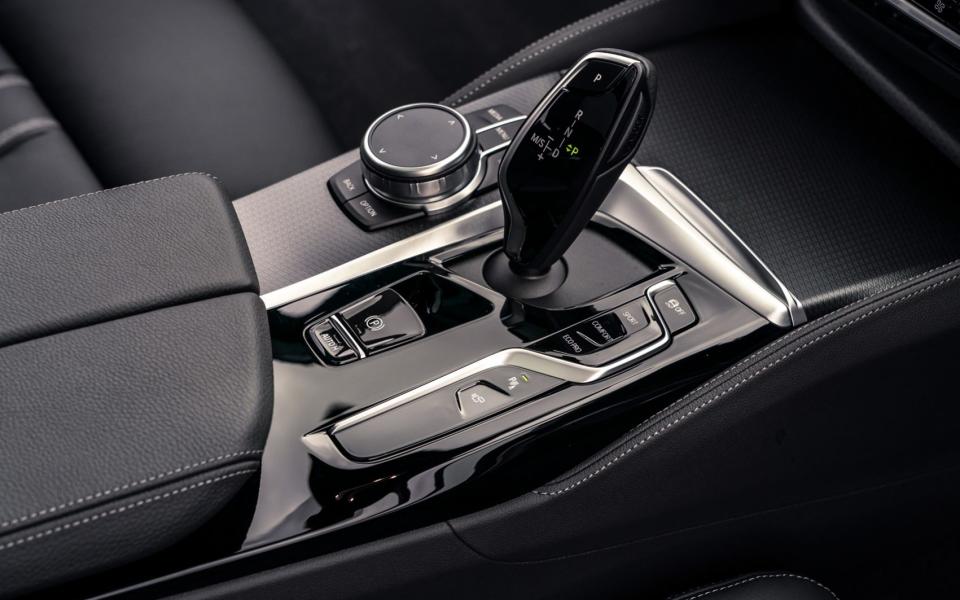
However, the BMW fights back with impressively low fuel consumption and comparatively reasonable maintenance costs, the savings from which should at least mitigate those higher ownership costs if not surpass them – especially if you do a high mileage.
The BMW is a compelling company car, too, with some of the lowest emissions in its class. Granted, that slightly higher P11D value stands against it, but on the whole, you should find your company car tax bills are more affordable than with most rivals. Do keep in mind the Jaguar XF Sportbrake on this front, though; its low emissions and low P11D value make it even cheaper.
But isn't diesel discredited?
For all that diesel has been pilloried, these latest diesels tend to be just as environmentally friendly as their petrol equivalents, if not more so; compare the 520d and 520i, and you’ll find the difference in NOx output is negligible; the former chucks out fewer hydrocarbons and less CO2, while also using less fuel.

Granted, those advantages rely on emissions-reducing technology that could throw a reliability spanner in the works later in life – but then again, you could say that of most petrol-engined cars, too, given they now tend to come with the same sort of kit.
What’s more, in a large estate like this one, the extra torque of a diesel engine makes more sense, and given a huge proportion of 5-Series will be sold as company cars, those lower CO2 emissions will reduce costs further.
Hitting the right notes
To set it apart from its rivals, there’s one thing a BMW must do well, and that’s handle. Happily, even in estate form, even with the extra weight of those hybrid gubbins, and even in this lowliest diesel form, the 5 Series still does.
Where it really scores is in the progressive, agile way its chassis is set up. Every little flick of the wheel results in a proportionate response from the nose, albeit in a linear and entirely predictable way, without any of the forced dartiness you get in some modern cars.
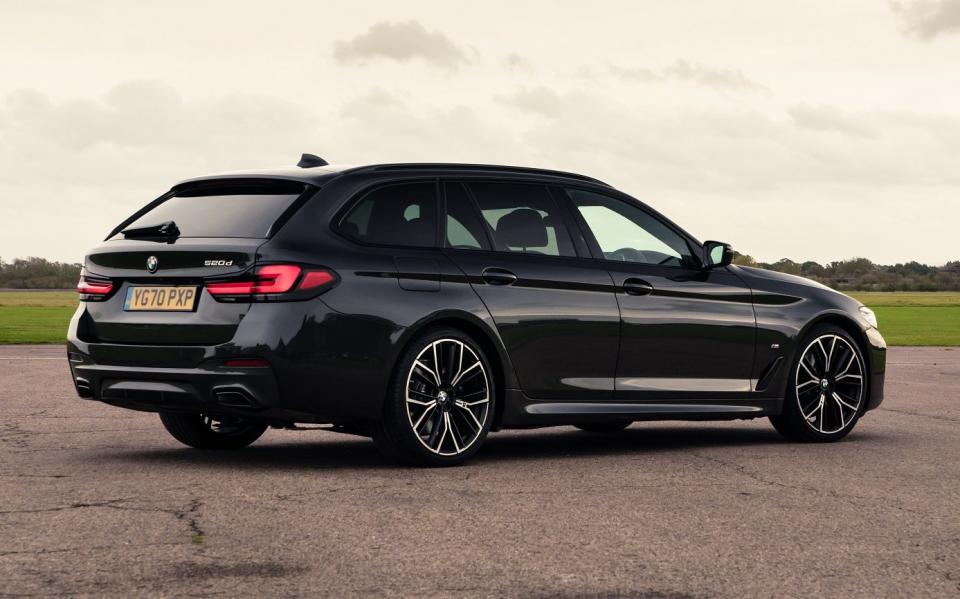
And while all four wheels feel relentlessly tacked to the road surface, you can still sense the car rolling subtly on its springs and tyres as you push it harder into bends, allowing you to gauge exactly how much rope it’s willing to give you.
Its size and weight mean it doesn’t offer the sheer exhilaration of, say, a hot hatchback. But what makes the 5-Series so enjoyable is its tactility; the trust you develop that it’ll do exactly what you ask, and the satisfaction it delivers simply from involving you in the process. The result is a car you can flow down a back road at a moderate pace, savouring the way it breathes beneath you and responds to each little input.
The ride quality in our test car was largely decent enough, reacting well to bumps both large and small, but it was marred slightly by a constant background noise of fidgets and jiggles. To be fair, that fault could be attributed to the optional 20-inch wheels and skin-tight tyres fitted to our example, or it could be down to the slightly stiffer suspension you get with the M Sport version. Go the former – or, better still, both – and, as we know from past experience, the 5 Series is a good deal more supple.
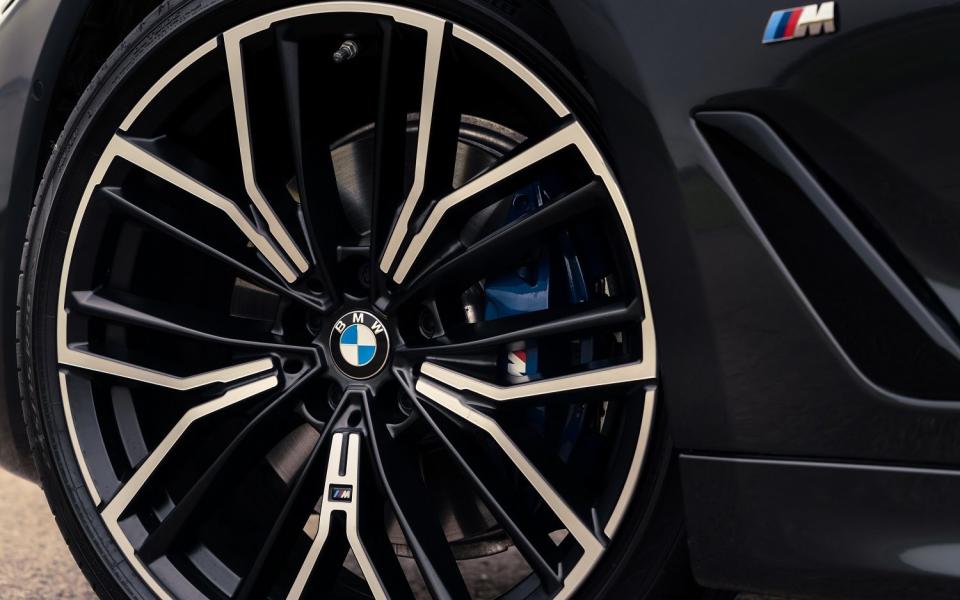
Out on the motorway, too, the 5 is still as good as you’d hope. Again, a touch of tyre noise from those whopping wheels intrudes, but otherwise things are serene.
What’s more, this diesel engine is still one of the best; a touch more vocal than the petrol alternative at idle, granted, but at cruising speeds you’d be hard-pushed to tell the difference. And matched to the slick eight-speed automatic gearbox, progress is almost always effortless; only when you’re really gunning the engine, perhaps up a motorway slip road with the car fully loaded, will you wish for the extra grunt of the bigger diesel.
The Telegraph verdict
This 520d makes a strong case for the continued existence of the diesel estate. It’s just as environmentally friendly as its petrol equivalent, if not more so, not to mention more economical. Yet it’s also faster and more flexible.
And while its practicality and versatility are not quite up there with an SUV’s, the benefits an estate offers in terms of handling and fuel economy are considerable and worth having. Besides, you’d have to be a real die-hard SUV nut to call this car impractical.
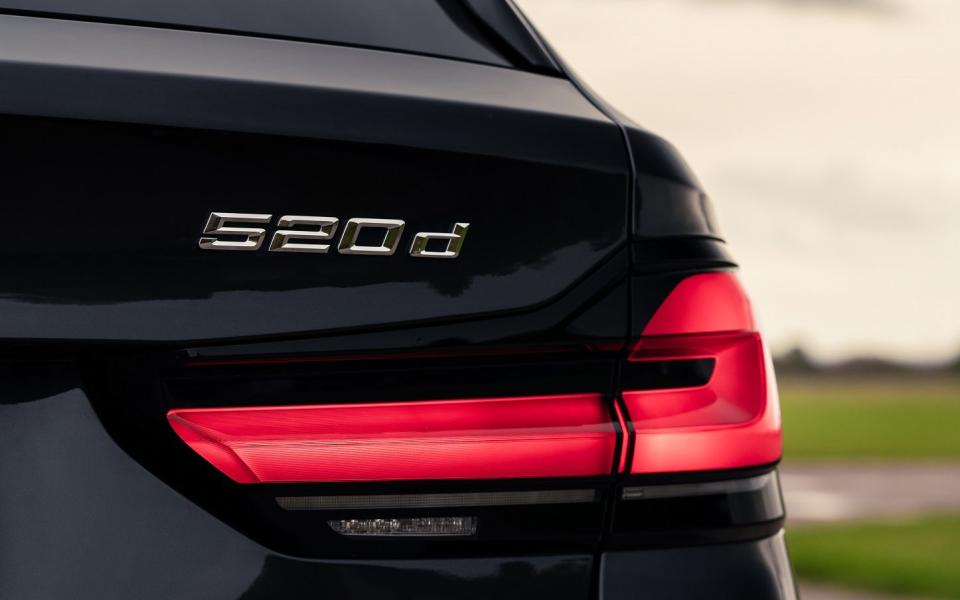
As for the rest of it, this latest 5 Series is predictably brilliant. Granted, the same caveats apply as before, which are that it’s best-served in its simplest form; as an SE with the more comfortable suspension, or if you must have an M Sport, then at least with the standard wheels.
Granted, there’s an element of tinkering around the edges to this facelift, but that’s to be expected. After all, the 5 Series was a class act in the first place – this new version only makes it all the more so.
Telegraph rating: Five stars out of five
The facts
On test: BMW 520d M Sport Touring
How much? £45,100 on the road
How fast? 140mph, 0-62mph in 7.6sec
How economical? 55.4mpg (WLTP Combined)
Engine/gearbox: 1,995cc four-cylinder diesel with 187bhp, eight-speed automatic gearbox, rear-wheel drive
The electric bits: 48V starter-generator mild hybrid
Electric range: N/A
CO2 emissions: 126g/km
VED: £165 first year, £465/year for five years thereafter, then £140/year
Warranty: 3 years / 60,000 miles
Boot size: 560 litres
Spare wheel as standard: No (not available)
The rivals
Audi A6 40 TDI S Line Avant
201bhp, 49.6mpg, £46,380 on the road
By comparison with the 5 Series, this A6 looks pricey to own and run, either as a private buy or as a company car, and it isn’t quite as slick to drive either. Granted, it’ll offer you just as much room, but of the two, we reckon the BMW makes more sense.
Jaguar XF D200 R-Dynamic SE Sportbrake
201bhp, 54.2mpg, £38,585 on the road
At this price, the XF looks seriously tempting. It’s even better to drive – albeit marginally – than the BMW, just as spacious, and thanks to the mild hybrid engine, it’s almost as efficient. Yet it’ll cost you considerably less in company car tax, or to buy outright. Get down to your Jaguar showroom before they realise.
Mercedes-Benz E220d AMG Line Estate
191bhp, 50.4mpg, £44,180 on the road
If what you really need is the biggest estate out there, then you’ve found it. The gargantuan Merc will swallow 60 litres more luggage than the BMW. It isn’t quite as sweet to drive, but neither is it a disaster – and with the optional air suspension, which we’d strongly recommend, it rides almost as smoothly as an S-Class. The interior’s a thing of beauty, too.
For new and used buying guides, tips and expert advice, visit our Advice section, or sign up to our newsletter here
To talk all things motoring with the Telegraph Cars team join the Telegraph Motoring Club Facebook group here

 Yahoo News
Yahoo News 
